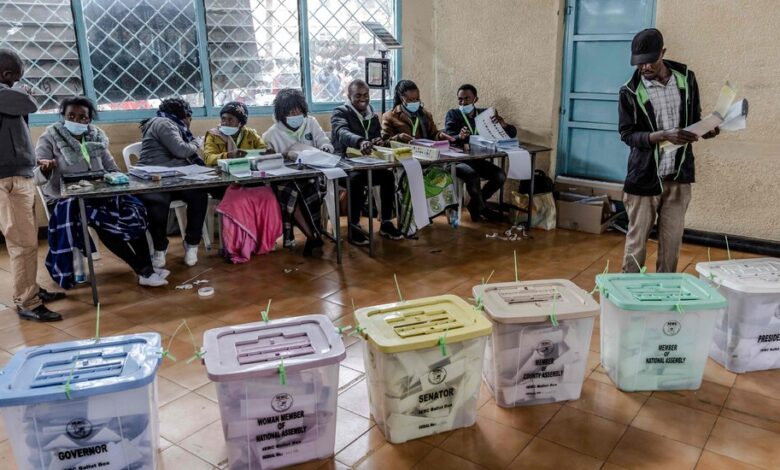Here’s how Kenyan elections work.

Elections in Kenya are passionately fought, and turnout is usually high. Up to 80 percent of voters cast their ballots in the elections in August 2017. This election, too, has galvanized the country.
When and where do people vote?
Polling stations opened on Tuesday at 6 a.m., with 22.1 million people registered to vote, including Kenyans living abroad and in prison. Voters are casting their ballots at over 46,000 polling stations, mostly in schools and in open grounds like parking lots and public parks, but also in community halls, universities and health clinics.
Voting is expected to close at 5 p.m., but anyone waiting in line at that hour will still be allowed to vote.
What happens at the polling stations?
To cast a ballot, voters must show either a national identification card or a valid passport. At the polling station, their identities are checked using a biometric machine. After that, voters are handed six color-coded paper ballots: for president, governor, senator, member of Parliament, woman’s representative and member of county assembly.
A total of 16,100 candidates — 1,962 of them women — are vying for these positions, according to the electoral commission.
Are there outside monitors?
The election commission has accredited 18,000 local and international observers, who are representing local and foreign organizations and governments, including the African Union, the European Union and The Carter Center.
How are the ballots tabulated?
At each of the 46,000 polling stations, officials are supposed to use an electronic tablet to send a digital image of their presidential results directly to the national tallying center in the capital, Nairobi. Those forms are also supposed to be available online, allowing anyone to independently tabulate the results as they come in.
In areas with no cellphone coverage, the election commission says it will provide satellite equipment for the transmission of the results.
Separately, the physical results forms are supposed to be sent to one of 290 constituency tallying centers, before being forwarded to Nairobi. There, the electoral commission is then supposed to verify the electronic results against the physical forms, before announcing a national result.
How soon will the results be known?
Once voting closes, presidential ballots will be the first to be counted. The electoral commission has one week to declare the results of that vote.
To be declared winner, a candidate must receive 50 percent of the vote plus one more, and at least 25 percent of the vote in 24 of the country’s 47 counties. If no candidate passes this bar, a runoff vote between the top two candidates must be held within 30 days.
Any citizen or group can challenge the results at the Supreme Court within seven days. The court must deliver its decision within two weeks. If judges nullify the results, as they did in 2017, a fresh vote is supposed to be held within 60 days.